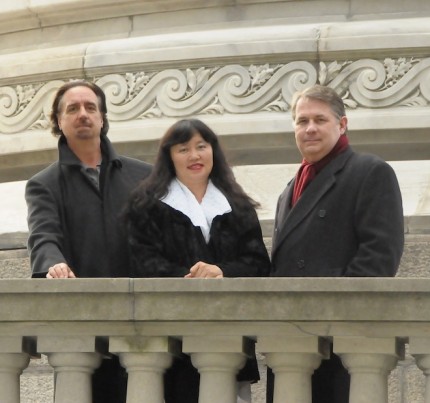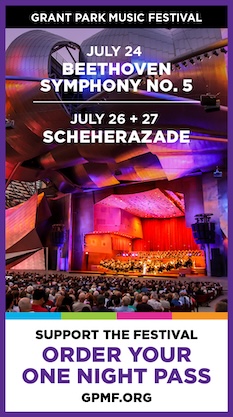Chamber Music Society serves up rewarding program of piano trios

For the middle event of its five-concert Chicago season, the Chamber Music Society of Lincoln Center presented an evening of piano trios Tuesday night at the Harris Theater.
If the program of three cornerstone works didn’t offer much in the way of adventurous programming, the vital and simpatico musicianship by cellist David Finckel and pianist Wu Han–CMS co-artistic directors–with violinist Philip Setzer were consistently polished, engaging and rewarding.
Early Beethoven doesn’t get much earlier than his Opus 1 piano trios, and the second of that set led off the evening.
The 23-year-old composer was clearly hoping to make an impact with his first published music and the Trio in G major is cast on a large scale, spanning over a half hour. At times one can feel the youthful Beethoven attempting to reconcile his explosive dynamism and quirky vision with sonata form, as in the awkward, long-winded opening movement, which, even for Beethoven, has one false ending too many.
Yet the bustling main theme is richly characteristic and the musicians were fully in synch with the late 18th-century spirit, with Setzer’s elegant violin playing conveying the light post-Rococo charm. Launched by Wu Han and echoed by the string players, the Largo’s poised theme was rendered with rapt delicacy, with lovely, finely calibrated expression by all. The lightning finale proved exhilarating, with the whirlwind main theme thrown off and batted around with bracing speed and velocity.
Shostakovich’s wartime Piano Trio No. 2 is stronger stuff, a desolate work that reflects the bleak era (1944). The musicians had the full measure of the opening section with the ghostly muted harmonics of the strings setting the foreboding tone. With forceful playing by Wu Han, the Scherzo went with a frantic, desperation belying the heavy folk rhythms.
Against sepulchral piano chords, Setzer’s fragile violin theme in the slow movement conveyed the tragic, searching quality of Shostakovich’s finest interior music. The finale was launched with apt mordant insistence though the cumulative intensity wasn’t quite sustained to the coda, in an otherwise strong and dramatic performance.
Dvorak’s “Dumky” Piano Trio in E minor ended the evening. Tuesday night’s performance eschewed the usual approach of lyrical warmth and affection for a leaner, more pointed quality that made the Czech composer’s trio seem startlingly modern at times.
If some charm and Bohemian flavor were lost in the process, the rapid-fire alternations between slow melancholy and bristling energy felt more edgy—less like bumptious folk tunes and closer to an unnerving musical manifestation of borderline personality syndrome. The Poco adagio was especially atmospheric in a bleak and broken fashion, and all three musicians were consistently alive to the music with alert ensemble and expressive unanimity.
The Chamber Music Society of Lincoln Center’s next concert is 7:30 p.m. March 9. The program offers Mozart’s “Kegelstatt” Trio in E-flat major, Mendelssohn’s Andante and Allegro, Paul Schoenfield’s Trio for clarinet, violin, and piano, and Schumann’s Piano Quartet, Op. 47. harristheaterchicago.org
Posted in Performances
